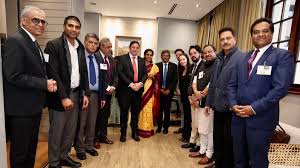PRETORIA: The Group-7 all-party delegation, led by NCP-SCP MP Supriya Sule, concluded its diplomatic visit to South Africa with a series of meetings involving political leaders, think tanks, and the Indian diaspora at India House in Pretoria, the administrative capital of South Africa.
The members of the delegation included Supriya Sule, Rajiv Pratap Rudy, Vikramjeet Singh Sahney, Manish Tewari, Anurag Singh Thakur, Lavu Sri Krishna devarayalu, Anand Sharma, former Minister of Commerce & Industry, V Muraleedharan, Former Minister of State for External Affairs, and Syed Akbaruddin, former Permanent Representative of India to the UN.
The visit, part of India’s broader diplomatic outreach following the terror attack in Jammu and Kashmir’s Pahalgam and the subsequent Operation Sindoor, aimed to deepen bilateral ties and convey India’s firm stance against cross-border terrorism.
Speaking about the delegation’s engagements, Indian High Commissioner to South Africa Prabhat Kumar said, “Our MPs, who are members of the delegation, had a good meeting. Meetings were held with the political party, with the government, with the Indian community. After that, today at the think tank assembly, the ideas coming from India were shared with everyone. People understood them and expressed solidarity, acknowledging that yes, what India is saying is right.”
He added, “If we look at it, the visit of our committee and parliamentary delegation has been very successful.”
Kumar highlighted the strong historic ties between India and South Africa, recalling their joint struggle during apartheid. “Today, there was also a meeting with the African National Congress, and it was strongly emphasized that the relationship between India and South Africa is very old. We stood together during the apartheid struggle and supported them, so the African National Congress and South Africa will always stand with us.”
He further noted that the message of support came not only from the ANC but also from other parties such as the Democratic Alliance, which recognized the presence of a large Indian-origin community in South Africa.
Addressing the purpose of the visit, Kumar said, “The main objective of the delegation that came was to convey what we are planning to do going forward. The idea of the ‘new normal,’ as presented by the Prime Minister, was conveyed very well to everyone.”
He added, “The relationship between South Africa and India is very deep and old. South Africa is with us, and whenever a moment comes on the international stage, I am confident that they will stand with us.”
Kumar explained that the delegation’s focus was also on communicating India’s response framework for terror attacks.
“But the purpose of the current delegation was slightly different–it was to communicate how we will respond if we are attacked, or if we face a terrorist attack, how we will react. The ‘new normal’ that the Prime Minister talked about, that was presented here.”
The visit comes in the aftermath of the April 22 terror attack in Pahalgam, Jammu and Kashmir, which killed 26 people, including a foreign tourist. In response, India launched Operation Sindoor on May 7 targeting terror camps linked to multiple terror groups.


